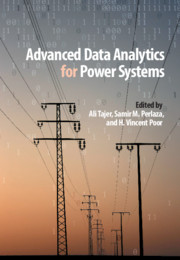Book contents
- Frontmatter
- Contents
- List of Contributors
- Preface
- Part I Statistical Learning
- Part II Data-Driven Anomaly Detection
- Part III Data Quality, Integrity, and Privacy
- Part IV Signal Processing
- Part V Large-Scale Optimization
- Part VI Game Theory
- 19 Distributed Power Consumption Scheduling
- 20 Electric Vehicles and Mean-Field
- 21 Prosumer Behavior: Decision Making with Bounded Horizon
- 22 Storage Allocation for Price Volatility Management in Electricity Markets
- Index
19 - Distributed Power Consumption Scheduling
from Part VI - Game Theory
Published online by Cambridge University Press: 22 March 2021
- Frontmatter
- Contents
- List of Contributors
- Preface
- Part I Statistical Learning
- Part II Data-Driven Anomaly Detection
- Part III Data Quality, Integrity, and Privacy
- Part IV Signal Processing
- Part V Large-Scale Optimization
- Part VI Game Theory
- 19 Distributed Power Consumption Scheduling
- 20 Electric Vehicles and Mean-Field
- 21 Prosumer Behavior: Decision Making with Bounded Horizon
- 22 Storage Allocation for Price Volatility Management in Electricity Markets
- Index
Summary
This chapter studies the impact of the deployment of electric vehicles (EVs) at a large scale on the existing and future energy networks. The impact on the grid is assessed in terms of residential distribution network (DN) costs. Essentially, the main goal to optimize the battery charging schedules of EVs to minimize a cost that takes into account residential distribution transformer aging and the distribution energy losses. Within this context, the underlying mathematical tool is a static noncooperative game that describes the interaction between all EVs and the DN operator. An equilibrium analysis is conducted for this game in both its atomic and nonatomic versions.
- Type
- Chapter
- Information
- Advanced Data Analytics for Power Systems , pp. 483 - 503Publisher: Cambridge University PressPrint publication year: 2021

